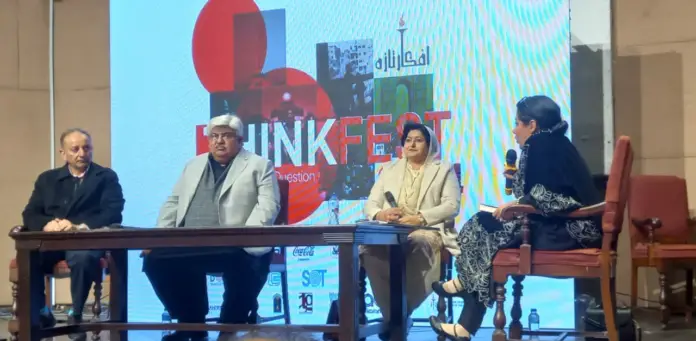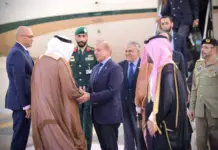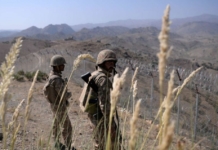The second day of Afkar e Taza Thinkfest 2024 witnessed a thought-provoking session with the unveiling of the book “The Dilemma of Energy Security: Political and Institutional Hazards in Case of Pakistan (1947-2020)” by Dr. Asia Mukhtar, an Associate Professor at Kinnaird College.
The panel for the event included Dr. Asia Mukhtar herself, Rashid Langrial, Federal Secretary, and PML-N leader Musadiq Malik.
The session delved into the theoretical understanding of energy security, specifically focusing on its implications for Pakistan.
Dr. Asia Mukhtar’s book explored the vulnerabilities faced by Pakistan in the energy sector, offering a comprehensive analysis of the South Asian region and the role of SAARC (South Asian Association for Regional Cooperation). The book identified the challenges and proposed potential solutions to address the energy security dilemma.
During the panel discussion, Dr. Asia Mukhtar emphasized the importance of energy security, stating, “Energy security is not just a regional or national agenda; it is a global imperative. Our economic growth and prosperity are intricately linked to energy, making it a vital aspect of our lives. The concept of energy security involves traditional and non-traditional dimensions, and it plays a crucial role in the survival and sustainability of nations.”
She elaborated on Dressel’s framework, highlighting the five S’s – supply, sufficiency, insurability, survivability, and sustainability – as essential criteria for assessing energy security.
Dr. Mukhtar emphasized that these criteria are not static and can vary among South Asian nations. She stressed the need for cooperation in the region to bridge the existing gaps and exploit the untapped growth potential.
“If we want to progress, we have to work on energy,” Dr. Asia Mukhtar added, underlining the collaborative efforts required to enhance energy security in South Asia.
Responding to a question on the operative attitude of South Asian studies regarding the energy security dilemma, Dr. Mukhtar noted, “There is a considerable room for growth.
The potential for cooperation among South Asian states is evident, especially in terms of energy resources. While challenges exist, there is optimism, especially with nations like Nepal and Bhutan actively engaging in energy agreements.”
Rashid Langrial and Musadiq Malik also provided valuable insights during the discussion, emphasizing the need for a unified approach to addressing energy challenges in Pakistan. The book launch and panel discussion left the audience with a deeper understanding of the complexities surrounding energy security and the potential avenues for collaboration in the South Asian region.







